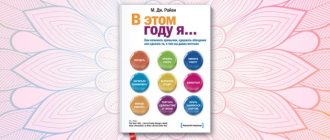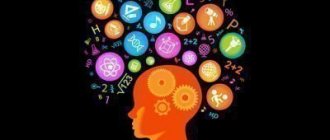Will can and should be a source of pride much more than talent. If talent is the development of natural inclinations, then a strong will is a victory achieved every minute over instincts, over drives that the will curbs and suppresses, over obstacles and obstacles that it overcomes, over all sorts of difficulties that it heroically overcomes. Honore de Balzac
How often do we lack the motivation and willpower to quit smoking, not eating at night, playing sports or getting an education? We constantly start a new life on Monday, and by the end of the week we already return to our old habits. However, the good news is that we can all change if we really want to. Each of us has an inner core that hides under a dense layer of fears and doubts. Find it, and you will definitely be able to turn the whole world upside down and change your life for the better. We hope that these three stories about people who were able to show character in difficult times will help you get the right mood and find inspiration for new achievements.
Definition
In the formation of moral and volitional qualities, not only moral attitudes and the desire for success are taken into account, but also the characteristics of the nervous system, which are innate, such as weakness - strength, inertia - mobility.
Example: in people with a weak nervous system, fears are more pronounced, so it is more difficult for them to show courage than for strong ones. That is, a person is not strong, courageous and decisive not because he does not want to, but because he has few inclinations for this.
The good news is that developing moral and volitional qualities is possible for every person.
Psychologists and the object of their research
Will is a function of the psyche that affects all aspects of human life. It defines orderliness and the pursuit of a specific goal. The consciousness of the activities of a particular person depends on the will. A volitional action, as Rubinstein defined, is a purposeful act through which an individual achieves some goal defined for himself. Thanks to the will, as you can learn from Rubinstein, impulses are subject to the control of consciousness, and a person has the opportunity to correct the world in which he lives, focusing on his own plan and idea.
Will is also a person’s ability to regulate his behavior. It is believed to be a tool of self-determination. Thanks to this mental feature, the individual is freed from circumstances pressing on him from the outside. Thanks to the will, life receives a subjective aspect.
Individual approach
Desire alone is not enough to achieve a goal, no matter what inclinations a person has. In any case, endurance, patience, sensitivity and skill will come in handy.
In addition, even one person can manifest volitional qualities differently: somewhere better, somewhere worse. Thus, will in psychology is a balance between a person and the world around him, a conscious attempt to regulate one’s activities and behavior in order to overcome all obstacles.
Therefore, there is no single concept of “will” for all people. Otherwise, it would be predictable that one will always cope, and the other will always fail. And this is the trick: anyone can cope if they find their balance and manage to get together to get a result.
What kind of person can be called a strong personality? This is determined by two factors: the concept of strength and moral qualities, such as integrity, discipline, organization and the like. And these are the moral and volitional qualities of a person.
In ordinary life, a person’s volitional behavior can be determined by several strong qualities that are combined with moral principles. For example, it could be heroism in a dead end situation, or it could be heroism as self-sacrifice. Therefore, it is important to consider the will in the complex of manifested qualities and circumstances in which a person finds himself.
What is will
Will is one of the most important components of personality, which determines a person’s effectiveness in all areas of life. This is the ability to mobilize your internal resources to achieve your goals and move towards them, maintaining a consistently high level of motivation throughout the entire journey.
No matter how outstanding talents and abilities an individual possesses by nature, without strong will and self-discipline he risks spending his entire life “hammering nails with a microscope.”
Take a look around. The world as we know it is the result of an act of will and the daring of strong-willed people. Without will there would be no great works of art, scientific discoveries, or space flights. Everything we admire is created by this power within us.
History knows many examples of people with phenomenal willpower. The most striking of them, perhaps, is Alexander the Great. Born into a royal family, he had everything one could dream of. He could have rolled around like cheese all his life, without knowing worries and troubles, but he chose a different path. His indomitable will and ambition made him the greatest commander in human history who never lost a single battle.
Classification
To understand what kind of person can be called a strong personality, let’s highlight the main character qualities by which it can be identified. And let’s immediately make a reservation that it is not possible for one person to have all the characteristics well developed. Although each one can be trained individually, and at any stage of development.
Moral and volitional qualities are divided into:
- Commitment to the goal (tenacity, perseverance, initiative).
- The ability to control oneself (discipline, endurance, seriousness of intentions).
- Courage (principle, courage and selflessness).
Let us consider moral and volitional character traits and their characteristics in more detail.
Independence
This refers to a person’s ability and desire to act without anyone’s help. This is one of the main criteria for the fullness of an individual. It is manifested in independent decision-making, self-control, implementation of the intended plan and, finally, bearing responsibility for one’s actions.
The role of parents in the formation of moral and volitional qualities in the child comes first. Independence can be noticed in a person even in preschool age.
At first, children use this quality to realize their goals, and then for self-affirmation. When a child grows up to high school, he uses independence mainly to experience and know himself, to test his capabilities.
Initiative
This is one of the types of independence, expressed in the implementation of such actions that will be the beginning of something new or will serve as a means of changing the existing way of life.
If you develop this quality, it turns into enterprise. This is social courage, overcoming the fear of responsibility. This is also a volitional characteristic of a person’s behavior and is motivation. Developed initiative makes a person energetic, searching and creative. It develops leadership and entrepreneurial qualities.
Patience
In a general sense, this is a long-term counteraction to undesirable factors (usually physiological (fatigue, hunger, pain, fatigue)) that prevent one from achieving a goal within the allotted period of time. This quality begins to manifest itself when a person experiences internal discomfort, an obstacle to completing a task, and begins to experience it.
If we are talking about mental or physical work, then there is a feeling of fatigue, which in turn is associated with a state of fatigue. Patience can be demonstrated by overcoming fatigue. In this case, to continue to work effectively, a person needs to apply additional resources.
The time during which he can do this is an indicator of his endurance, it characterizes his patience. This is a general volitional characteristic that does not depend on the type of difficulty overcome. If we talk about strengthening physical qualities and moral-volitional qualities, then will also depends on the mental parameters of a person.
Examples of developed will
Everyone who studies foreign languages has at least once heard about the polyglot Heinrich Schliemann. Every day he memorized several pages of printed text in the language he was studying. Such persistence helped Schliemann achieve a good level of proficiency in a new language within the first few months.
No less interesting in this regard is the biography of the domestic scientist A. A. Lyubishchev. During his life, he was able to write about 12 thousand pages of scientific works devoted to biological and philosophical research. Careful saving of life's time helped him do this - for modern time management gurus, Lyubishchev is one of the most important examples.
Perseverance
The desire to achieve. In this period of time, achieve what you want, despite all the difficulties and despite unsuccessful attempts. This is the desire to achieve a goal at any cost. An example of a moral-volitional quality: an athlete who is not given a difficult element. If he doesn’t give up after the first to tenth unsuccessful attempt, then he is showing perseverance.
This quality also has a negative manifestation - stubbornness. This is a manifestation of persistence against common sense. Often a person exhibits this quality because the decision belongs to him, and refusal to achieve a goal undermines his authority. Speaking about children is a form of protest caused by the desire to show independence and initiative. Sometimes this is rude treatment by adults, ignoring their needs, or, conversely, indulging all children's whims.
This is also a consequence of the desire to assert oneself, although rationally it is a waste of resources. Stubbornness is based on a person’s conviction that a goal is achievable, contrary to other people’s opinions.
It must be taken into account that the opinion on the advisability of working in a certain direction is also subjective. In fact, it also shows the stubbornness that this is impossible “just because.”
Stubbornness is confused with a negative manifestation of perseverance, when it is a negative manifestation of persistence. These concepts are not identical.
Marshmallow experiment
In the 1960s, researcher Walter Mischel, sometimes jokingly called the “Father of Self-Control,” and his students conducted the now classic “marshmallow experiment.” Young children had to go into a room where they were asked to make a choice: get a marshmallow or a cookie; or wait for 20 minutes and then get two marshmallows or two livers. Scientists found that their behavior in the experimental situation predetermined their future adult life. Those who showed more persistence and could make themselves wait for cookies received higher grades in school. And at the age of 27-32 years, they did not suffer from obesity, achieved professional goals faster, and coped with stress and difficulties more easily. When brain scans were carried out on representatives of both categories (strong-willed and “weak”), it turned out that they had significantly different brain areas responsible for the tendency to overeat and other bad habits.
Based on these experiments, scientists were able to deduce the main method by which everyone can strengthen their willpower: you need to mentally “cool down” the temptations of the present, and, on the contrary, “warm up” the future goal. The method is effective no matter how old you are.
In order to master self-control skills, you need to prepare the necessary instructions for yourself in advance. Refusal from temptation cannot happen with the wave of a magic wand - after all, at this decisive moment only the “harmful” strategy will dominate. When we break down, our psychology protects us well from unnecessary self-criticism:
- yes, today I yelled at my wife because it was a bad day at work;
- I ate half the cake because I can’t cope with all these problems;
- It's not my fault, it's his fault.
And such self-justifications significantly reduce our chances that in the future we will be able to learn to control fleeting impulses.
Perseverance
The systematic and long-term emergence of will on a person’s path to achieving a goal, despite difficulties and obstacles. To a greater extent, this quality reflects the purposefulness of the individual and represents focus.
Persistence is realized through the constant manifestation of perseverance and patience, which leads to confusion of these two volitional qualities. Intelligence tests actually reveal perseverance, while persistence depends on:
- human motivation (to a much greater extent than persistence);
- the degree of confidence in the ability to achieve a distant goal;
- the presence of strong-willed attitudes to overcome difficulties;
- nervous system (as opposed to the same persistence).
And it begins with moral and volitional education in childhood.
Psychic phenomenon
Experts in the field of philosophy and psychology, trying to determine what human will is, proposed calling it a unique phenomenon of a person regulating his own activities. In many respects, it is precisely due to this aspect that a vector orientation of consciousness and its states towards an indefinite goal is possible. Will allows you to concentrate your efforts in order to achieve what you want. A characteristic feature of will is the impossibility of reducing a phenomenon to a specific objective aspect. It cannot be called pure extra-practical consciousness. Will represents the connection between an action, an object, an object, an impulse, a need.
The study of the will and human activity allows us to say with confidence that this mental function presupposes objectification by the subject and legitimation of desire, its selection into a goal. To some extent, will is the result of reflective reasoning about a person’s needs, and at the same time it is a predictive analysis of what may result from an action. Will is a combination of desire and a sense of obligation, combined with the concentration of efforts that must be made to implement what is formulated. Will at the same time is the ability of a person to realize the dominant goal, distinguish it from all others and abandon alternatives that impede the achievement of the goal. The core of the act of will is awareness of the value of the goal and the significance of its implementation for the person. Psychologists point out that will is always associated with a person’s ability to assess the correspondence between the formulated goal and the internal scale of values.
Self-control
This is a composite volitional characteristic that includes several concepts: courage, endurance, determination. It is associated with self-regulation and self-control in emotional terms, as well as self-restraint in emotional response.
It is also defined as a person’s ability not to get lost in difficult or unexpected situations, as well as the ability to manage one’s actions, while being judicious and restraining negative emotions. Simply put, self-control is power over yourself. And this is one of the main characteristics of a strong-willed person.
Versatile and important: will is necessary for man
This phenomenon has long been a source of surprise to researchers of the human psyche. Will is a person’s ability to balance between inhibition and motivation. At the same time, activating a specific action and blocking others, focusing on a goal announced in advance. An act of will is the formulation of a decision, the determination of a method of struggle, the mobilization of forces to achieve what is desired.
The volitional phenomenon is determined by a subjective thesaurus, the articulation of information taking into account the meaning of the action for a particular individual. Will is associated with the attitudes of the individual and his predisposition to certain specific actions. In many ways, the speed of reaction to circumstances and the person’s state of readiness depend on them. As is known from social psychology, will sets a subjective human orientation towards some social value.
Excerpt
The ability to suppress rash, impulsive and emotional reactions, as well as strong desires and drives, aggression, which can incite conflict. Such actions of a strong-willed person include:
- physical attack (start a fight);
- passive-aggressive attack (the person slams the door when leaving);
- verbal attack (insult, altercation, barbs);
- indirect verbal (anger and dissatisfaction are expressed to third people, behind the offender’s back).
Self-control is also defined as composure and self-control in conflict. Although the first may be associated with a person’s insensitivity and emotional inexcitability. Another manifestation of endurance is stoicism, the ability to endure unpleasant influences or even suffering for a long time, life’s adversities for a long time.
This quality can be found when inappropriate or harmful desires are suppressed. Self-control is the inhibitory component of will (moral stability). It is also a suppression of spontaneity and inhibition of reaction and action. However, endurance is not patience or insensitivity. The first is related to performing an action and maintaining activity. The second is with the psychological structure of the individual.
Intemperance is the opposite of restraint. It may be caused by a corresponding psychological illness or bad character.
Will and habits
In many ways, the formation of will is helped by exercise associated with giving up bad habits and developing useful ones. Any person has harmful ones, even if the person does not talk about them; in the depths of consciousness there is a desire to leave them in the past. Some people want to give up tobacco products or alcohol, others want to adjust their diet. By the way, some people believe that you can quit smoking by always keeping a pack of cigarettes with you. This opinion is wrong. Restriction provokes an even stronger desire, but in the absence of restriction, activity is completely determined by volitional efforts.
Forming new habits also involves effort: a habit is an action performed unconsciously. Once you have formed it for yourself, you need to introduce it into everyday life and resort to action so often that it becomes an integral part of your personality. Some time must pass - only then will what is done become an organic part of everyday life, not requiring additional effort. If you can achieve this, you can confidently talk about successful willpower training.
Determination
The ability of an individual to quickly make a decision in an important situation. At the same time, we are not talking about haste, when the speed of reaction can lead to the adoption and implementation of a rash decision, which will lead to an undesirable result. Determination is determined by two factors at once: the significance of the situation and the time of decision-making.
This is not making a rash decision without hesitation or delay, since here we are talking about frivolity. And this is not making a quick decision when a person has all the information and is confident in the correctness of the action. Decisiveness takes place when it comes to a person’s uncertainty in a given situation and the likelihood of success of his actions. That is, there is some doubt that must be overcome.
There are two points here that are often found in the definition of the concept, but are essentially erroneous:
- timeliness. This has the right to life if there is a clear time limit for making a decision. In other cases, it is about the speed of decision-making, and not about the “right moment” for it;
- the most correct solution. It is a characteristic of the adequacy of understanding the situation and information, as well as the thought process. Right and wrong decisions can be made at any speed. Determination is associated with the time to make a decision when there is a choice, although it can also be manifested in a situation where there is no alternative, and the person knows exactly what he needs to do (for example, throw a free ball).
Decisiveness refers to the time of understanding the readiness and execution of the desired action. This time varies for different people, but it is stable.
Sometimes determination is called courage. And although these concepts correlate with each other, they are not identical. In some situations they actually appear together, but are still two separate and independent qualities.
Decisiveness is characterized by a minimum of time in a difficult situation to make a decision, such as “ready or not ready,” when it is already known what needs to be done. The time to make a decision in an important situation is a characteristic of a person. A person will be more decisive in one situation than in another, while a courageous person is not always decisive. And this difference comes precisely from sports. In a situation where there is no danger, there is no courage. Those who are indecisive can show courage, and those who are determined can show fear.
Create and develop
In psychology, human will is the quality thanks to which a creative person organizes life, despite the problems of the surrounding world. A person who has this mental characteristic in a pronounced form is able to deal with difficulties and overcome them. Some call will the ability to exist despite the need to fight, while others say that tension itself can already be called will. If he is not in life, it is wrong to call a person strong-willed. To develop this quality, it is necessary to show wisdom and strive for civility. A strong-willed person is one who can and is ready to cooperate and through this make his life more effective. By organizing a life situation, taking into account prospects and one’s own accumulated wealth, a strong-willed person achieves success. To some extent, it is the mental function in question that provides the possibility of development and is the way in which it occurs. It is formed and improved, and manifests itself most clearly in conditions of negative motivation, that is, a situation when a person clearly understands what kind of person she does not want to be, and is ready to make every effort to avoid becoming such a person.
The character and will of a person are the mental characteristics of an individual, improving and developing over the years. Psychologists specializing in these issues call for developing the will, making efforts to do so within reason. By overloading oneself, a person will not receive any positive outcome. Volitional loads must be combined with positive motives, taking into account that will to some extent is a force, but it reflects not muscle mass and its fitness, but character traits. To properly manage your resources, you need to be wise, be able to correctly analyze what is happening, and make rational efforts. Will allows a person to move towards an elusive goal, but it can also be a tool through which the creative search for an alternative path becomes more effective and simpler.
Courage
Synonyms for the concept: courage, dedication, integrity. This is fearlessness, courage and valor - a person’s ability to suppress the body’s instinctive defensive reactions that arise in extreme situations and manage their behavior effectively.
Three forms can be distinguished separately:
- Courage. A situation where a person knows about the danger, but still completes the task.
- Bravery. A person experiences emotional arousal from a sense of danger.
- Courage. When fear is replaced by a sense of duty, and a person strives to achieve a socially significant goal.
These are different states and goals for a person and society, and they do not relate to a person’s personal characteristics.
Courage
Courage is aimed at realizing humane goals and restoring justice. And if these aspects are absent, then we are no longer talking about courage, but about bravado, rebellion, adventurism and the like.
Cowardice is the opposite in meaning to courage. It is characterized by a person’s condition when he is unable to perform an action that meets moral requirements or is unable to resist the temptation to act immorally. This is a manifestation of cowardice.
As a rule, this occurs due to fear - a biological reaction of a person when assessing a situation as dangerous for important categories (life, prestige), and in essence is a natural desire to escape from danger.
Among healthy people, no one is fearless. Willpower does not lie in the absence of fear, but in the decision to control one’s behavior without succumbing to fear and the desire to avoid danger.
If a person is not aware of the danger, then there is no question of courage. Because such a person does not overcome anything. Courage is about taking risks even when there is fear, and managing your behavior regardless of it. The less the influence of fear on a person, the higher his level of courage.
So courage is restraining one’s defense mechanisms and continuing to implement one’s intentions soberly and efficiently, in situations that are dangerous to one’s health and prestige. True courage is intelligent.
Strength of will
Willpower is one of the most important character traits of a person, thanks to which he is able to achieve colossal results in his life. By developing our willpower, we develop our personality, and it is depending on our current level of development that we occupy the appropriate position in society. Ask yourself, dear readers, before you continue reading this article - how much does your life depend on your willpower? Personally, I can tell you with complete confidence that your every action, your every decision, your every thought - they all depend on how well or how poorly developed your willpower is. First of all, your effectiveness depends on it, on your willpower. You simply cannot achieve any significant success in your life if you do not have at least a tiny bit of willpower. You won’t even be able to read this article to the end if your willpower turns out to be completely undeveloped, but I’m just going to tell you in it about how this very inner strength of yours, on which so much depends in your life, can be developed. So be patient and focus your attention on my words, and most importantly, read this article to the end, because willpower, friends, is really important, very important.
What is willpower? Willpower is a powerful, inexhaustible energy within a person, which he, as a person, consciously activates and directs to achieve the desired result. For example, you have a desire or perhaps a need to do something, and you begin to act in accordance with this desire-need in order to achieve the result you need. And how persistent and disciplined you will be on the path to achieving your goal, how many internal resources you will use to achieve it, this is willpower. That is, it is a force that is expressed in a person’s activation of the maximum amount of energy and concentration of the maximum amount of resources that he possesses in order to achieve the result he needs. Thus, using willpower, a person consciously controls his internal energy, he awakens it and directs it in a certain direction, and he also uses all his internal resources, forcing his body to work in the way he needs. I need, for example, to strain my brains in order to solve some problem - I, with the help of my willpower, give my brains a command to work on this or that task and control the work of my brain from beginning to end until the desired goal is achieved me the result. You see, what willpower is about is your conscious desire to activate your internal energy and resources for something for which you think they need to be activated, that’s what it is. I explained to you my understanding of such a phenomenon as willpower, friends, below we will discuss how, based on this understanding, this very power can be developed and used.
Let's assume that you want something, then you take certain actions and - you get it! Or, at the very least, you make every effort to get what you want. There should be no “buts”, no “ifs”, no “maybes” and “I’ll try”. If you know exactly what you really need and why you need it, then you strive with all your might to get it, using all your internal resources and using all your internal energy to achieve your goal. You see, doubts have no place here; doubts prevent willpower from manifesting itself. You probably believe that in order to develop willpower, you need to subject yourself to strict discipline, thereby taking complete control of yourself. In general, strict self-discipline can really develop willpower, and I will even say that you must be disciplined in order for you to have strength. But you can develop willpower in another way, and more effective in terms of long-term results. And this method is friends, not faith, although it is often referred to when they talk about the superpowers of a believer, whom faith helps to survive any adversity and cope with many difficulties. Faith is necessary for those people who, firstly, are morally weak, and secondly, are not knowledgeable in certain issues and who do not want to study something and delve into something, it’s easier for them and they want something. then to believe or not to believe. But a thinking person, a student, a person looking for answers to his questions, does not need faith in principle, because faith, for all its merits, is blind, and faith can always be shaken. So the method I’m talking about is not irrational, while faith is still an irrational phenomenon.
To understand what the meaning of this method is, let’s turn our attention to what motivates us in general, what makes us be active people. What makes us want something, strive for something, what makes us active people? Our instincts, friends, it is thanks to them that we live and do at least something in our lives, for the sake, first of all, of itself, for the sake of life. You and I have three basic instincts, this is the instinct of self-preservation, which prompts us to seek food and protection, this is the sexual instinct, or the instinct of reproduction, which prompts us to look for a partner for procreation, and this is the instinct of dominance or the instinct of power, which we need for self-affirmation, leadership, to fight for the best piece and for the best place, to achieve success in life. All these instincts are different forms of one single instinct - the instinct of life. Everything that makes us live and strive for something is connected with the instinct of life, which makes us satisfy our natural needs. It is precisely to focus on these same needs in the first place, as well as to satisfy our spiritual needs, in the second place, that we need willpower, which, as you probably already guessed, is also a product of our life instinct. As long as a person has energy, he will live, but the universe needs us to live, and will is energy. Do you understand what this connection is? We must live, humanity must live, the universe must live and develop, for some purpose unknown to us, and we, as part of this universe, as its constituent parts, regardless of our desires, must do everything to survive. It is possible that we, people, are simply an intermediate link in evolution, which should contribute to the manifestation of something new and more perfect, maybe self-reproducing robots or something similar, some kind of crown of nature’s creation should perhaps appear with our help. Well, that's true, by the way. So, if we want to develop willpower in ourselves, we must realize the meaning of our existence, and having realized this, become as active as possible in order to realize ourselves to the maximum and live life with meaning.
Understand, friends, a person is given various qualities so that with their help he helps the universe develop and improve, while developing and improving himself. Poor, sick, stupid, lazy, passive, weak, whining and complaining about everything and everyone, this world does not need us. That's why weaklings get nothing from life, because they don't try to take anything from it and don't try to give anything to it. And in general, if you look at our life this way, you can see that the universe does not need a degenerate person. And not every person can demonstrate their inner strength, because not every person can use it competently. What kind of willpower can there be if a person doesn’t even understand why he lives, why he needs to study, why work, why create, why do anything for himself and others. Do you want to develop your willpower? Then, friends, learn to see meaning in everything you do in your life, in everything you want. Sometimes this is difficult to do on your own, without carefully examining every aspect of your life, but if you conduct a thorough introspection, if you think about the meaning of your own life, then you will figure out what exactly and why you want to get from it and what you can give to it. . And when you decide on your goals, your mission, if you want, the word mission sounds more powerful, you will be able to awaken your inner strength to fulfill this mission.
As I said above, we should start by satisfying our natural, animal needs, in order, firstly, to maintain our physical body in a viable state, and secondly, to somehow sort out procreation, because nature will not leave us behind , until we either continue our race, or until we deceive her in this matter, and thirdly, to occupy the highest possible position in society, since a high position in society, to which the instinct of power pushes us, gives great opportunities to a person . It is difficult to change the world if you are a nobody and have no name, and it is much easier to accomplish something grandiose if you have power. This is something grandiose, this is the very mission that is above all those natural, animal needs that our instincts call on us all to satisfy. We humans, unlike animals, can strive for much more than just satisfying our animal needs, we can put forward the most unusual ideas, we can set grandiose goals for ourselves and then make incredible efforts to achieve them. It is this feature of ours, this gift, that we all, if possible, need to use in order to live a bright, rich and very interesting life.
To awaken our willpower, we need to understand what we want from life, why we want it and how we are going to achieve it. You must explain to yourself why you get out of bed in the morning, why you go somewhere and do something, why you set goals for yourself and achieve them, why you even need to maintain life in your body. Your willpower can make you a superman, it can help you develop self-discipline and other strengths, but to develop willpower itself, you need to increase your level of awareness. You need to stop, calm down and think about your life. Often people don’t even understand what they are doing and why, they just do it the way everyone else does it, because it’s the way it should be, it seems like it should be, because everyone else does it. And it’s difficult for them to break out of this whole routine in which they are mired, it’s difficult to look beyond the wheel in which they spin like squirrels. But in order to tap into your hidden reserves, to force your body to be more than just a piece of flabby meat, you need to understand why you need to put effort into doing something and achieving something. Our brain and our body as a whole are a machine that will work only if it has fuel, which for us, in addition to instincts, is some idea that we consciously choose for ourselves as a guide in life or which we invent for ourselves. Well, a person cannot live just like that, just to live, to exist, yes, maybe, but not to live. People are not plants, they breathe air, eat food and drink water, not only in order to live, but also in order to live for something. But to maintain life in the body, we also need will, right? After all, the same food itself will not go into our mouths; it must be obtained and consumed. So you need to start small - with high-quality satisfaction of your natural needs, and then, having understood the enormity of this idea called life, you should begin to set grandiose goals for yourself and accomplish great things. And you, rest assured, will have the necessary internal reserves for this.
You can immediately become infected with some great idea in order to start living for the sake of something more meaningful than just taking care of your body. True, without this very care of your body you will not survive, so you will still have to make efforts to provide yourself with the amount of resources necessary to maintain life. Keep in mind that it is one thing when our instincts force us to exercise willpower so that we can survive in a difficult situation or make our life more comfortable, but it is quite another when we consciously decide to do something that is not easy to do , which will require us to mobilize all our personal qualities, and despite any obstacles to achieve our goal. A person can act contrary to all his instincts, being absolutely sure that what he is doing is really necessary for him. Very often in this case, they remember faith, the power of which is truly enormous, but faith, as mentioned above, can be shaken, faith is something that can always be questioned, while awareness cannot be shaken, because awareness awakens and enlightens, and then the person no longer doubts or hesitates, he simply sees everything and understands everything, and based on this understanding he makes a decision about what and why he should do. The grander your goal in life, friends, the more energy will awaken in you to help you achieve this goal. But an important condition for awakening this energy will be your full understanding of why you need to achieve some goal, what is the point of it? I assure you, our desires can coincide with our capabilities, because our capabilities will definitely match our desires if we understand why we want something.
You can do a lot; your body has reserves that you don’t even know about. But if you don’t want anything in this life, if you don’t need anything other than to eat, drink and copulate, you will live your whole life in a very limited world and will not even know what you were capable of as an individual. You will not be able to realize yourself, you will not be able to get “everything” from life if you know nothing about it. It is common for a normal person to ask himself, and at the same time others, questions such as “why” and “what for”. And you know that children very often ask adults these questions, but adults, those who don’t care about children, wean them off asking these questions. But these questions help us reveal our hidden abilities. We want to know why we live, why we learn something, why we work and why we should do what we don’t want to do, why we should deny ourselves something, and why we should achieve something, something to strive for? Aren't these natural questions for a normal, thinking person? But you and I are in no hurry to give answers to these questions. Do you know why? Yes, because most of what you and I do is called serving the interests of others. Most people themselves, with their own eyes, can see that what they are doing is not at all what they need, not what they want to do. Many of us live for the sake of other people's goals and other people's interests, and even if people do not realize this, then on a subconscious level they feel it all, and therefore they do not have any willpower, so they are passive. Which of us wants to voluntarily, with enthusiasm, serve someone, try for someone else, squeeze all the juice out of ourselves for the sake of other people's interests? I’m sure no one, because it’s contrary to our nature.
It’s true, friends, our life is such that you want it or not, but sometimes you have to do what you don’t want to do, you have to endure it, for the sake of a better future, for the sake of new opportunities in the future. Some experts, for example, the same psychologists, advise specifically doing what a person does not want to do, so that in this way a person can develop the habit of overcoming laziness, fear, hostility and aversion to something or someone. That is, they offer people to develop willpower through strength, through I can’t. This advice, of course, is good, effective, but not fundamental, since not every person can decide to do things that he does not want to do, especially in cases where no one is forcing him to do anything. Therefore, a person will not be able to develop the habit of doing something through force, because he will not be able, or if he is not able, to start doing something unpleasant for him. I have already written and will write it again, I will repeat it again, because, as you know, repetition is the mother of teaching, that a person can train himself, like a dog, for example, or he can teach and enlighten himself. In one case, he will learn some commands, some algorithm of behavior, and in the other, he will come to the realization of what he needs to do and why. The first is simpler, but less effective, the second is more complex, but much more effective and profitable. Therefore, if for some reason you don’t want to do something, then maybe, instead of forcing yourself to do this unpleasant thing for you, you should think carefully about the necessity and meaning of this thing that you don’t want to do. want to do, and thanks to understanding the need for this thing for you, want to do it, want to do something that you don’t want to do yet? In my opinion, this is much more effective in overcoming various difficulties in life. And perhaps for some it will be easier than training yourself like a dog, forcing yourself to do something through force, through I can’t.
Of course, there is meaning and necessity, at least for us, not in all the things that we have to do, especially for someone else, but this meaning, in the form of benefit, can be found, if you look hard enough, in any business . Even the most unpleasant and most difficult problems can be very useful for a person, because they contribute to his development, they make him stronger. Solving your own, or even other people’s, problems means training your mind. It's so useful. Love your problem, and you will be much more pleased to solve it, you will want to solve it, it will not scare you. I repeat once again, there is meaning and benefit in everything, even in what you fiercely hate and what you are very afraid of. You just need to find this meaning and this benefit, then you need to realize this benefit and, thanks to this awareness, awaken willpower in yourself, which will help you do something, overcome some difficulties, and also achieve the goals you have set for yourself. You and I, friends, are designed in such a way that if we don’t use something, then it either dies or is inactive. If you don’t strain your muscles, then they will atrophy, if you don’t strain your brain, then you are guaranteed insanity. And with willpower things are the same. If you are passive and you don’t need anything, if you don’t realize the meaning of your desires and don’t understand the meaning of your own life, if you don’t set any grandiose goals for yourself, then why would this force within you awaken, why should it awaken?
Life, friends, is a struggle, well, not only a struggle, of course, but still, first of all, a struggle. And in order to fight - for life, for our ideas, for our values, we must understand why we need this. Our instincts sometimes force us to make quite great efforts in the struggle for life, but if we talk about a higher level, located beyond our animal instincts, then our desires, conscious desires, allow us to set great goals for ourselves and with the help of the awakened within we have the willpower to achieve them. Our possibilities are truly limitless, but in order for these possibilities to turn from words into concrete actions and thus be realized by us, we must begin to consciously approach our life, thinking deeply about both each specific moment in it and about it itself as a whole.
Integrity
This is the quality of a person who consciously follows some chosen principles (beliefs, views), which are the norm of behavior for him.
Integrity is based on confidence in one’s own rightness and the fairness of the accepted order. There is a set of laws before which everyone is equal. And there are people who are ready to circumvent laws and regulations. They may offer more favorable conditions in exchange for some benefit for themselves. The ability to resist temptation and adhere to generally accepted order is a manifestation of integrity and moral stability.
And this manifestation becomes a volitional act when adherence to principles threatens a person’s life, health and well-being, while a deviation from beliefs for the sake of profit will indicate a person’s unprincipledness.
Discipline
This is the desire and conscious desire to follow order. The concept includes restraint (restraining impulses that come at the wrong time).
It has a moral and intellectual component, as it includes generally accepted norms of behavior and rationality applicable in situations of choice. The behavior of a disciplined person is ordered and in conjunction with all other systems.
This is the ability and desire to manage one’s behavior in such a way as to accomplish assigned tasks. It is based on the ability to control one’s desires and subordinate one’s behavior to the requirements of necessity. Once formed, it turns into self-discipline.
Too strict discipline can lead to passive thinking and an inability to adapt to changing environmental conditions. Initially, discipline is achieved by motivation either to avoid punishment or for one’s own benefit (the carrot and stick method).
Diligence
The desire to complete a task efficiently and conscientiously is the main component of diligence (or diligence, diligence). There is a desire to do the job, to demonstrate oneself, an honest attitude to work - moral and motivational components. There is also a volitional aspect: a person has to overcome difficulties, focus on work and make volitional efforts to complete it.
If a person exhibits these qualities not only for personal purposes, but also for the public good, then his actions are assessed from a moral point of view and become morally volitional. In this way, it becomes possible to satisfy the need for social recognition.
Moral and volitional qualities are general characteristics of volitional behavior, and here it is difficult to separate the moral and volitional components. Because these are not just interrelated characteristics, but flowing from one another.
Every person is constantly faced with tasks that require effort. To obtain high results and strong-willed ones - including. Just as you shouldn’t give in to panic and become a victim of your fears, you shouldn’t be filled with unnecessary optimism, which distorts the picture of reality.
For many areas of life, the development of moral and volitional qualities is of decisive importance. Demonstration of some does not guarantee the presence of others and does not entail their appearance. It also happens that some volitional qualities are even mutually exclusive, as in the case of patience and perseverance.
Troy Fox – original weight 197 kg, lost 104 kg.
0
Troy's story is also very interesting - it all started with the fact that Troy's parents divorced after his mother lost half her weight through surgery. Having changed externally, she completely changed internally. It is unclear what prompted her to take such a step, but she left, leaving her son with his father. This greatly weakened the boy’s will, he began to “eat away” his grief, but his father motivated him to work on himself. After a short time, the guy achieved good results. He became seriously interested in sports and, as you can see in the photo, by the age of 22 he became a handsome and slender guy.











